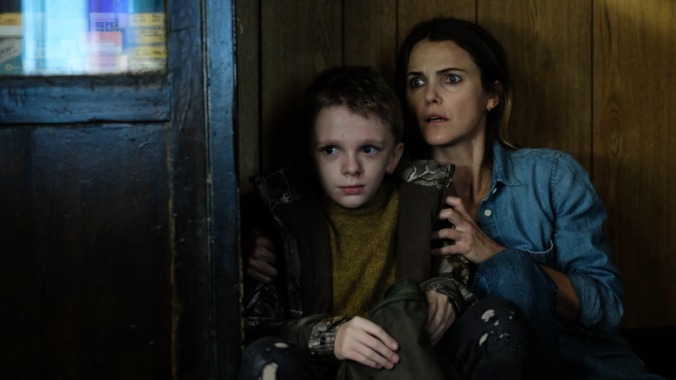Antlers drowns a good monster movie in dour metaphor
Keri Russell, Jesse Plemons, and impeccable craft make this muddled creature feature worth watching

There’s a pretty good monster movie lurking somewhere beneath the oppressively depressive skin of Scott Cooper’s Antlers. It peeks its head out here and there—just like the monster itself, a hoofed ancestral beast the film catches only in quick glimpses, in what you could call a variation on the classic Jaws tact of getting more from less. The trouble here is endemic to the present age of creature feature: Everyone involved wants the monster to be more than a monster. Once upon a time, there was subtext in these films. It has since been swallowed whole by fearsome oversized metaphors.
Antlers can’t even settle on a single metaphor. You almost have to feel bad for its deerlike main attraction, forced to shoulder the burden of multiple ills, like an all-purpose Smokey The Bear of humanity’s biggest boners. At first, the movie seems to be sticking to folkloric interpretation, the scroll of an epigraph whispering of Mother Nature’s nastier offspring. The camera glides over a body of water in scenic Oregon, landing on a line of billowing factories looming within the surrounding woods. When something snarling and unseen drops a pair of workers in this post-industrial corner of the Pacific Northwest, we have to wonder if the gnashing thing is attacking on behalf of the environment rather than its own bottomless appetite.
The movie has other ideas, enough to stock a social-issues film festival. Maybe the real monster is economic depression. Or maybe it’s the opioid crisis. Both cast a shadow over Cooper’s colorless small-town setting. They are related problems, of course—all part of the tapestry of America’s failures. They converge in the home of a young boy, Lucas Weaver (Jeremy T. Thomas), with dark circles under his eyes and dark events weighing on his heart. Behind a locked door, his father (Scott Haze) growls and wails, sickness in his blood. Lucas’ brother is with him, shifting the film’s theme again.
His teacher, Julia (Keri Russell), can see the evidence of Troubles At Home. She’s back in her hellishly depleted hometown after an eternity away, crashing with her lawman brother, Paul (Jesse Plemons), following the death of their father. Based on a short story by Nick Antosca, who co-wrote the screenplay with Cooper and Henry Chaisson, Antlers doles out the backstory of these estranged siblings in bits and pieces. Suffice to say, Julia knows all too well about the way children of abusive households instinctively protect the secret of their parents’ mistakes. And in Lucas, she sees both a mirror of her own traumatic history and a belated opportunity for redemption—a Clarice Starling quest to quiet the lambs screaming in her dreams.






























![Rob Reiner's son booked for murder amid homicide investigation [Updated]](https://img.pastemagazine.com/wp-content/avuploads/2025/12/15131025/MixCollage-15-Dec-2025-01-10-PM-9121.jpg)









